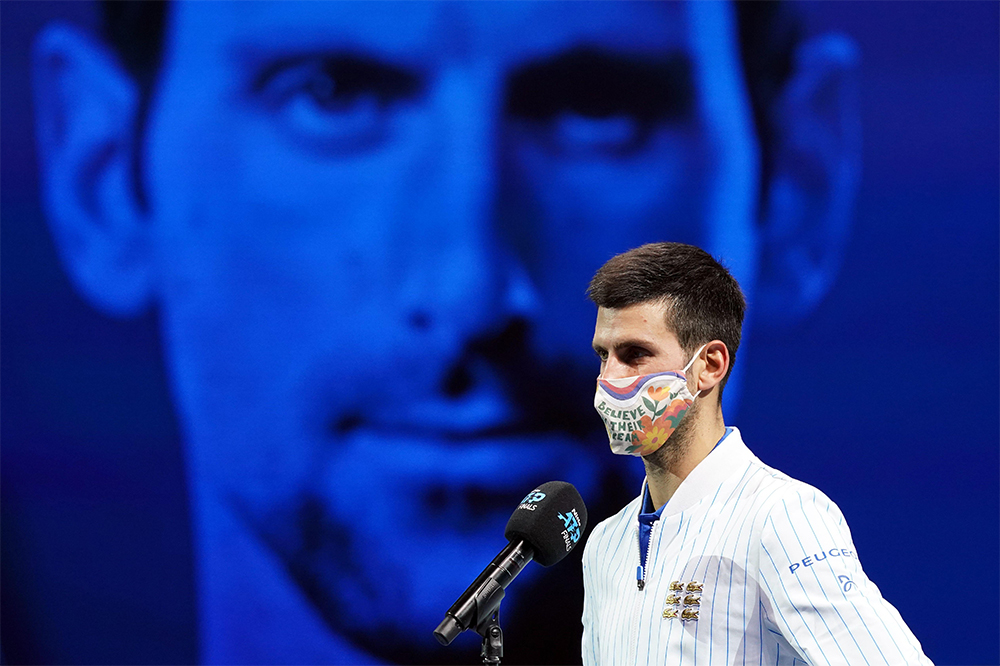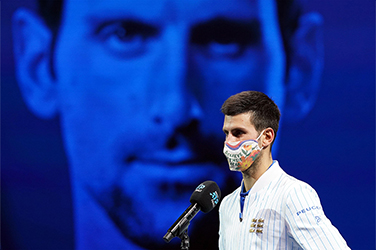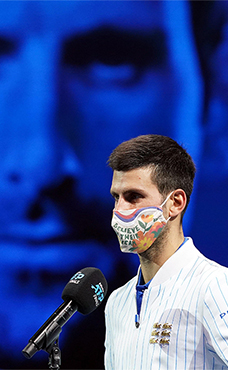- Free Article: No
- Contents Category: Language
- Custom Article Title: A hot novax summer: The influence of sport and Covid on Australian language
- Review Article: Yes
- Article Title: A hot novax summer
- Article Subtitle: The influence of sport and Covid on Australian language
- Online Only: No
- Custom Highlight Text:
The Australian summer was once again a story of Covid. Just as things were slowly reaching a state of ‘Covid-normal’, Omicron came along to present us with new, decidedly unwelcome, challenges. Despite Omicron, our summer did not pass by without one of its most defining features: sport. Many events went ahead as planned, not least the Australian Open tennis tournament.
- Article Hero Image (920px wide):

- Article Hero Image Caption: Novak Djokovic in a face mask during the ATP Finals in London (photograph by John Walton/Alamy)
- Alt Tag (Article Hero Image): Novak Djokovic in a face mask during the ATP Finals in London (photograph by John Walton/Alamy)
- Featured Image (400px * 250px):

- Alt Tag (Featured Image): 'A hot novax summer: The influence of sport and Covid on Australian language' by Amanda Laugesen
The 2022 Australian Open brought a whole new saga instigated by our Covid times: the tale of Novak Djokovic, or as he quickly came to be known, ‘Novax’ Djokovic. The Serbian tennis player was controversially granted an exemption from vaccination to play, only for his visa to be cancelled on his arrival. He was then taken into hotel detention (thereby casting an international spotlight on the refugees who have been in such detention for years). The case went to court, where his visa was restored. A few days later, the federal government cancelled the visa once again and, after an unsuccessful court appeal, Djokovic left the country without having competed.
For the lexicographer, the Djokovic case had an additional interest: it seemed inevitable and irresistible that people would call him Novax (or Novaxx, if your preference is for the double-x form of vax). The act of refusing an athlete entry to the country if they are unvaccinated was a topic of discussion, with the government signalling that such athletes ‘get vaccinated or get novaked’, as the ABC succinctly summarised Minister for Sport Richard Colbeck’s words. Whether we’ll see any other athletes get novaked remains to be seen.
From the unique terminology of Australian Rules football to the joys of campdrafting, the influence of sport on Australian English is well attested. Words derived from the names of sportspeople comprise a fascinating subset of this sports language. One we commonly use is fang. Used as a noun it means ‘a drive at high speed’; as a verb it means ‘to drive at high speed’. You can also fang it or be fanging. The word comes from the name of Argentinian racing car driver Juan Fangio (1911–95) who won five world championships in the 1950s.
Other champion sportspeople have inspired Australian English phrases. Don Bradman (1908–2001), Australia’s legendary cricket player set a standard you can be compared to: one can be the Bradman of something. First recorded in 1930, the phrase quickly applied to things as well as people, with one 1933 newspaper article referring to ‘the Bradman of deficits’. The sports cry up there Cazaly, inspired by South Melbourne AFL player Roy Cazaly (1893–1963), became a general cry of encouragement or approbation. Too easy Campese came into usage in the 1990s, paying tribute to Australian rugby player David Campese, who held the world record for the number of tries scored in test matches.
While great sporting triumphs are sometimes commemorated in the lexicon, one of the quirkier moments in sporting history gave rise to another phrase: to do a (Steven) Bradbury. At the 2002 Winter Olympics in Salt Lake City, Australian speed skater Steven Bradbury won a gold medal after all the many skaters ahead of him crashed out. He was the first person from a southern hemisphere country to win a gold medal at a Winter Olympics. Since then, the phrase has become a part of the Australian vernacular, now applied to whenever an unlikely winner emerges from a race, event, or even an election.
Australian English also has a large number of rhyming slang terms, and sportspeople feature heavily among them. They include boxers (Lionel Rose ‘nose’; Bill Lang ‘slang’), cricketers (Wally Grout ‘shout’), jockeys (Edgar Britt(s) ‘shit(s)’), and tennis players (Adrian Quist ‘pissed’). Rugby league footballers have perhaps been the most prolific sports contributors to rhyming slang, because rhyming slang seems to be used a lot in the code. They include Barry Beath ‘teeth’; Malcolm Clift ‘lift’; Ronnie Coote ‘root’; Mal Meninga ‘finger’; and Johnny Bliss ‘piss’. Only one sportswoman has been officially recorded in the rhyming slang lexicon – Dawn Fraser ‘razor’, but Ash Barty has inspired the Barty party and we have some evidence that Ash Barty is now also being used as rhyming slang for ‘party’.
Racehorses, too, have made their mark on the lexicon. Phar Lap is probably the best known of these: to have a heart as big as Phar Lap is to have great courage or stamina, and Phar Lap odds are very short odds. A more recent variant of the latter is Black Caviar odds. The word drongo for ‘a fool’ was likely influenced by Drongo, the name of a racehorse who ran between 1923 and 1925 and never won a race.
As long as sport continues to be so important to Australian society and culture, we will continue to monitor it for new words and expressions.



Comments powered by CComment